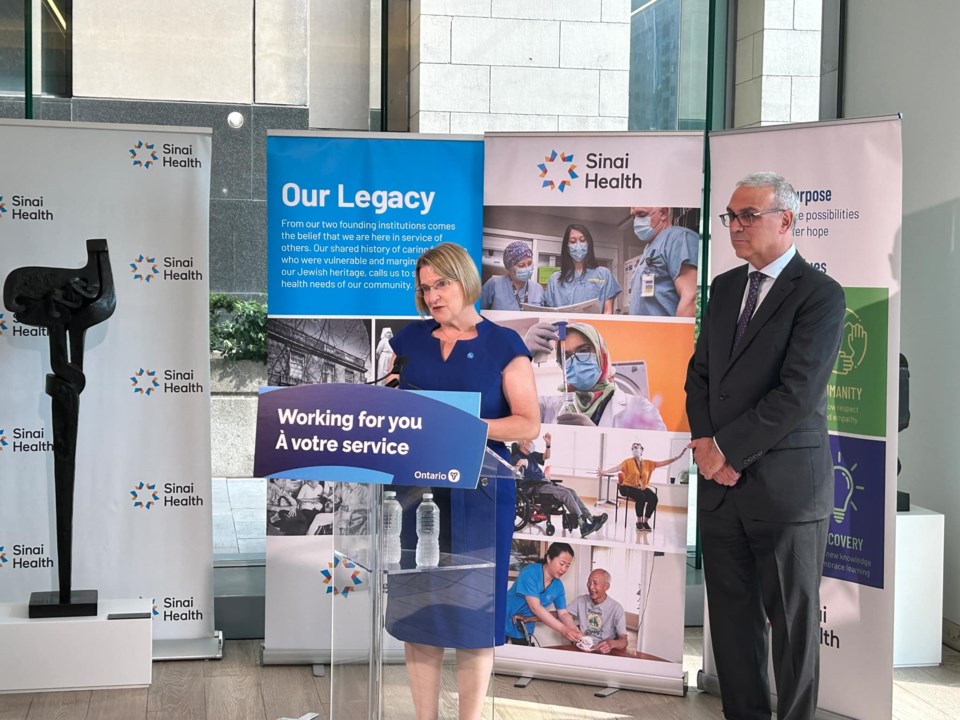Ontario's health minister poured cold water on the idea of involuntary treatment for people addicted to drugs, but didn't fully rule it out.
"We know whether it is related to mental health or our general physical health, that people have to be engaged in their treatment pathway," Sylvia Jones said at an unrelated Toronto press conference on Wednesday. "I have concerns that involuntary treatment would not lead to the outcomes that we want."
Jones conceded, however, that the current system "is not helping the people most in need."
"I am greatly concerned that we have more people who don't have access to treatment and people who are not taking advantage of the treatment facilities that are available," she said, adding that the Ford government has added more than 500 treatment beds across the province.
"For me, it's very much, how do we drive and make sure that people, when they're ready, get the treatment that they need?" she said.
Jones said the government is working on "some new initiatives that you will see coming out in the weeks to come."
Involuntary treatment was thrust into the national conversation when federal Conservative Leader Pierre Poilievre, widely considered the front-runner for the Prime Minister's Office in next year's election, said last week that he was open to the idea, but has doubts.
“I don’t know if you can take someone off the street that has not committed a prison offence and successfully rehabilitate them. If we can, I’m open to it, but I’d need to see more evidence at this point,” Poilievre said at the time.
Alberta Premier Danielle Smith has promised to pass an involuntary treatment law to allow a family member, doctor, or police officer to petition a court for an order that would force someone to undergo treatment when they are "a danger to themselves or others."
The legislation has not yet been tabled. Smith has said the so-called "compassionate intervention" would be a "last resort."
New Brunswick's government has introduced a forced treatment law, but its health minister said more time is needed to "get this right." Premier Blaine Higgs hasn't ruled out using the notwithstanding clause to get it passed.
The Canadian Civil Liberties Association has said forcing people into treatment "is unconstitutional and unlawful."
"Research shows that compelling people into treatment without their consent is counter productive and harmful. It is dangerous and irresponsible to attempt to legislate people into treatment," the CCLA's Equality Program director, Harini Sivalingam, said last year in response to New Brunswick's law.
"The New Brunswick government should respond to this public health crisis based on sound evidence from experts and with respect for fundamental rights," Sivalingam said.
In Ontario, the Ford government has taken a skeptical view of harm reduction measures, preferring, like many Conservative governments, to focus on treatment.
It launched a review of consumption and treatment services sites after a shooting outside of a site in Toronto neighbourhood last summer — putting pending and new applications for sites on hold.
Site operators, advocates and opposition parties have called on the government to hurry, saying lives are being lost. One Sudbury site had to shut down as it waited for news, which the premier said in March "shouldn't be too much longer."
Ford has said he disagrees with the chief medical officer of health's recommendation to decriminalize drug possession.
On Wednesday, Jones added that she's there for mayors who have complained of public drug use, saying she's "very concerned" about use in playgrounds and schoolyards
"We have to make sure that we continue to expand access to treatment," she said. "We're going to work fully with our municipal partners to make sure that we are operating and ensuring treatment for people who want and need that treatment in our communities."
Jones said there has "absolutely" been an uptick in the number of people seeking treatment since her government's bed expansion. Her office didn't share specific data by press time.
"What we're seeing is when you offer treatment, when you offer alternatives, people, when they are ready, take those opportunities," she said.
Toronto's mayor has complained of waits up to a year long for those seeking help.
Jones also added that new accountability measures for harm reduction services "to ensure staff and patient safety" will be part of a "larger, all-of-government approach." She stressed that treatment will be "a very large portion of the announcements that we are going to be making in the weeks ahead."




